In this edition of the Court judgements review, we look at SC’s order terming the electoral bonds scheme and all related amendments as unconstitutional, SC’s order that dependents of a deceased person involved in a road traffic accident should not receive double benefits, that elder sister cannot be legal guardian of younger sister unless authorized by competent court, and that breaking up and advising girlfriend to marry as per parent’s advice is not abetment to suicide.
SC: Electoral bonds scheme makes funding anonymous which violates the right to information of citizens
Electoral bonds are a financial instrument introduced in India to facilitate transparent political funding. They were first announced in the Union Budget of 2017-18 and subsequently notified by the government. The primary purpose of electoral bonds is to ensure that political funding is made through legal and transparent channels, reducing the use of black money in elections. However, in 2017, a case was filed by the Association for Democratic Reforms and others challenging the constitutionality of the scheme.
A Supreme Court Bench of five judges; Chief Justice DY Chandrachud and Justices Sanjiv Khanna, B R Gavai, J B Pardiwala, and Manoj Misra delivered a 232-page-long verdict in the case, Association for Democratic Reforms & Another vs Union of India & Others unanimously striking down the scheme. Some of the reasons cited by the Bench for the same are listed below:
- The non-disclosure of the identity of contributors to political parties through electoral bonds violated the right to information of the voters.
- The bench expressed concerns about the possibility of quid pro quo arrangements resulting from financial contributions to political parties. The lack of transparency in disclosing contributions made it difficult for voters to assess the correlation between policy-making and financial contributions, impacting the voters’ right to information.
- The bench argued that the de jure anonymity of contributors did not translate into de facto anonymity. There were gaps in the scheme that enabled political parties to know the particulars of the contributions made to them, reducing the effectiveness of the claimed anonymity.
- The bench held that the amendment to Section 182 of the Companies Act, 2013, permitting unlimited corporate contributions, including by shell companies, was antithetical to free and fair elections.
The Supreme Court directed the Election Commission of India (ECI) to share in the public domain, the details of the buyers of the electoral bonds and the amounts received by political parties since 12 April 2019, once the State Bank of India shares those details with the ECI. The court also stated that the donors can’t claim surprise since they know about the case.
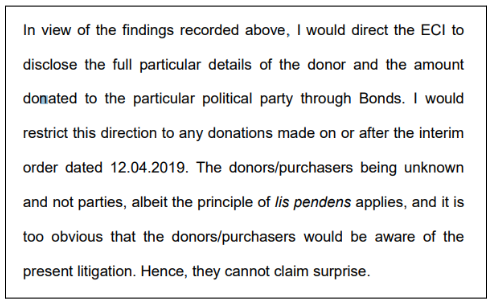
SC: Dependents of a deceased person involved in a road traffic accident should not receive double benefits
In Krishna & Others vs. Tek Chand & Others, the family of a deceased Haryana State Roadways driver, seeking compensation under the Motor Vehicle Act, had their claim rejected by the Tribunal. The rejection was based on the family’s eligibility for Rs. 31 lakhs under the Haryana government’s compassionate assistance policy, which exceeded their compensation entitlement. The High Court upheld this decision, resulting in the family being entitled to receive Rs. 3 lakhs after deducting the government policy amount from the total compensation claimed. The appellants, dissatisfied with the High Court’s decision, filed a Special Leave Appeal with the Supreme Court.
The Supreme Court Bench of Justices BV Nagarathna and Augustine George Masih relied on a 2016 judgment that held that an employer’s ex-gratia payment to the deceased employee’s family should be deducted from the compensation. The court added that when someone dies in a car accident due to someone else’s fault, their family gets compensation for their loss. It added that this compensation shouldn’t be given twice or be more than what’s fair. It means if someone dies in a car accident, their family shouldn’t get more money than the family of someone who died from an illness or another cause, according to the rules of the Haryana Government. The court thus declined the petition.
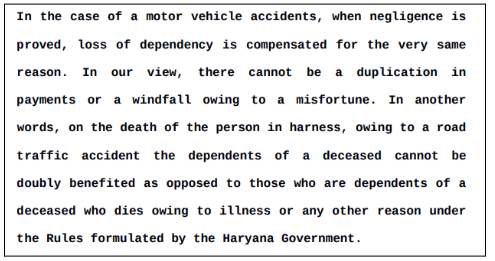
SC: Elder sister cannot be legal guardian of younger sister unless authorized by competent court
The case, Rita Dwivedi vs. the State of Himachal Pradesh & Others, involves three sisters. One of them filed a Habeas Corpus petition in the High Court of Punjab and Haryana in Chandigarh. She’s asking the court to produce Vibha Dwivedi. The petitioner claims that Vibha Dwivedi was taken to Canada illegally by Archana Sharma along with her husband. Since the High Court dismissed the petition, the petitioner approached the Supreme Court.
The Supreme Court Bench of Justices Aniruddha Bose and Sanjay Kumar held that an elder sister does not have a legal right to exercise guardianship except when there is an order by a competent Court. The bench dismissed the petitioner’s case, stating that they did not believe that filing a writ petition for Habeas Corpus relief was the appropriate legal action to address the petitioner’s concerns. Nevertheless, the court allowed the petitioner to approach the appropriate court to seek guardianship if the facts of the case justify such legal action.
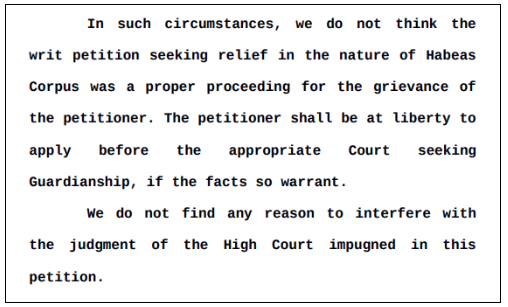
SC: Breaking up and advising girlfriend to marry as per parent’s advice is not abetment to suicide
In the case, Prabhu vs. the State Rep by the Inspector of Police & Another, a young woman in Tamil Nadu committed suicide following her boyfriend’s advice that she marry according to her parents’ wishes. The girl became distressed when the boyfriend’s family began searching for a potential bride. Following her death, the police filed an FIR against the boyfriend for abetment to suicide under Section 306 of the Indian Penal Code. The High Court refused to dismiss the case, following which he appealed to the Supreme Court.
The Supreme Court Bench of Justices Vikram Nath and K V Viswanathan observed that to prove ‘instigation’ of suicide, it needs to be demonstrated that the accused, through their actions or lack of action over time, created situations where the person who died had no choice but to commit suicide. The words spoken by the accused should imply that the person was left with no other option. Further, to be held responsible for abetting suicide, the person must have directly or indirectly incited the act and played an active role in facilitating it.
The Bench concluded that the appellant cannot be accused of abetting the suicide of the deceased girl as he did not play an active role through instigation or any act that facilitated the suicide. It noted that broken relationships and heartbreaks are part of everyday life and breaking up the relationship by advising her to marry in accordance with the advice of her parents was not abetment. Thus, the appeal was allowed and the pending criminal proceedings against the accused were quashed.
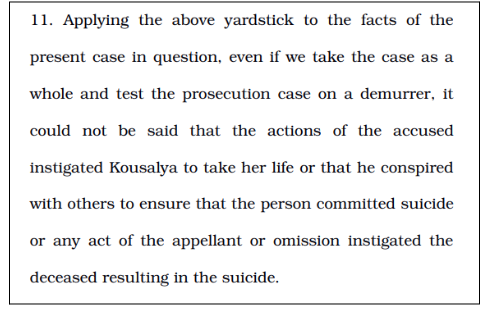
Allahabad HC: True love between two individuals cannot be controlled by law or State action
A series of cases including Pradeep Yadav vs. State of Uttar Pradesh involved three boys who were facing criminal proceedings for separate FIRs filed against them before the Allahabad High Court. The charges were related to the alleged offence of kidnapping, with the accusation being that they enticed away the daughters and got married to them, as per the girls’ relatives.
When dealing with the requests to quash the legal actions put forth by the husbands (boys), the High Court Bench of Justice Rahul Chaturvedi observed that in all the cases, the boys and girls had a prior understanding and were in a romantic relationship. The court also mentioned that the girls, in each case, left their homes independently. Since they were of legal age or very close to it, they had the right to choose their life partners and marry on their own accord.
It further added that continuing the criminal case against the husbands was unnecessary and caused distress for the couple, taking into consideration the victims’ statements and the circumstances. Furthermore, these cases involve young couples who, despite being of legal age, face obstacles from their parents instead of support for their marriage. The court added that it grapples with the dilemma of applying the law rigorously or considering the real-life consequences for couples who genuinely love each other. Stating that true love between two individuals, one or both of whom may be minors or minors on the verge of majority, cannot be controlled through rigours of law or State action. The Court quashed the criminal proceedings against the husbands.
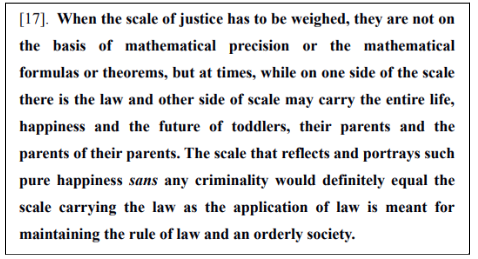
Punjab & Haryana HC: Prisoner may be allowed to attend important family events
In Nishan Singh vs. State of Punjab, the Punjab and Haryana High Court addressed the issue of denying prisoners the opportunity to attend significant family events. The case deals with a plea by a convict under Section 15 of the NDPS Act, seeking parole to participate in the ‘bhog ceremony’ of his recently deceased father. The petitioner argued that such denial would cause irreversible injustice to him and his family.
The single-judge bench of Justice Anoop Chitkara emphasized that a prisoner should not be deprived of attending important family occasions solely because immediate family members are not dependent on the prisoner. The court acknowledged the prisoner’s longing for family support and participation in essential functions, even if this carries the risk of social repercussions. The court, considering the petitioner’s plea and the broader principle involved, granted parole with certain terms and conditions. The petitioner was directed to surrender after the ‘bhog ceremony.’



